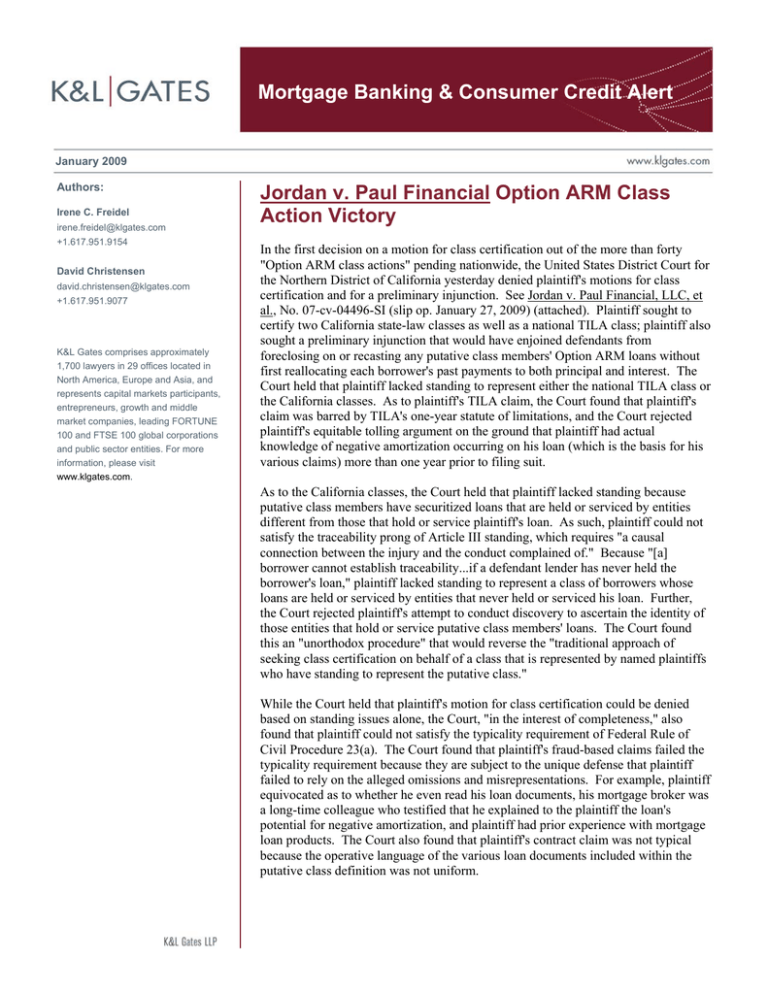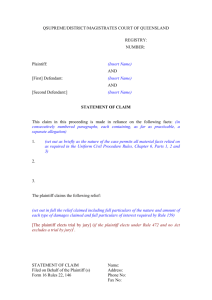
Mortgage Banking & Consumer Credit Alert
January 2009
Authors:
Irene C. Freidel
irene.freidel@klgates.com
+1.617.951.9154
David Christensen
david.christensen@klgates.com
+1.617.951.9077
K&L Gates comprises approximately
1,700 lawyers in 29 offices located in
North America, Europe and Asia, and
represents capital markets participants,
entrepreneurs, growth and middle
market companies, leading FORTUNE
100 and FTSE 100 global corporations
and public sector entities. For more
information, please visit
www.klgates.com.
Jordan v. Paul Financial Option ARM Class
Action Victory
In the first decision on a motion for class certification out of the more than forty
"Option ARM class actions" pending nationwide, the United States District Court for
the Northern District of California yesterday denied plaintiff's motions for class
certification and for a preliminary injunction. See Jordan v. Paul Financial, LLC, et
al., No. 07-cv-04496-SI (slip op. January 27, 2009) (attached). Plaintiff sought to
certify two California state-law classes as well as a national TILA class; plaintiff also
sought a preliminary injunction that would have enjoined defendants from
foreclosing on or recasting any putative class members' Option ARM loans without
first reallocating each borrower's past payments to both principal and interest. The
Court held that plaintiff lacked standing to represent either the national TILA class or
the California classes. As to plaintiff's TILA claim, the Court found that plaintiff's
claim was barred by TILA's one-year statute of limitations, and the Court rejected
plaintiff's equitable tolling argument on the ground that plaintiff had actual
knowledge of negative amortization occurring on his loan (which is the basis for his
various claims) more than one year prior to filing suit.
As to the California classes, the Court held that plaintiff lacked standing because
putative class members have securitized loans that are held or serviced by entities
different from those that hold or service plaintiff's loan. As such, plaintiff could not
satisfy the traceability prong of Article III standing, which requires "a causal
connection between the injury and the conduct complained of." Because "[a]
borrower cannot establish traceability...if a defendant lender has never held the
borrower's loan," plaintiff lacked standing to represent a class of borrowers whose
loans are held or serviced by entities that never held or serviced his loan. Further,
the Court rejected plaintiff's attempt to conduct discovery to ascertain the identity of
those entities that hold or service putative class members' loans. The Court found
this an "unorthodox procedure" that would reverse the "traditional approach of
seeking class certification on behalf of a class that is represented by named plaintiffs
who have standing to represent the putative class."
While the Court held that plaintiff's motion for class certification could be denied
based on standing issues alone, the Court, "in the interest of completeness," also
found that plaintiff could not satisfy the typicality requirement of Federal Rule of
Civil Procedure 23(a). The Court found that plaintiff's fraud-based claims failed the
typicality requirement because they are subject to the unique defense that plaintiff
failed to rely on the alleged omissions and misrepresentations. For example, plaintiff
equivocated as to whether he even read his loan documents, his mortgage broker was
a long-time colleague who testified that he explained to the plaintiff the loan's
potential for negative amortization, and plaintiff had prior experience with mortgage
loan products. The Court also found that plaintiff's contract claim was not typical
because the operative language of the various loan documents included within the
putative class definition was not uniform.
Mortgage Banking & Consumer Credit Alert
While courts have reached mixed results on motions
to dismiss Option ARM cases, Jordan is the first
decision on a motion for class certification and,
hopefully, will turn the tide in defendants' favor in
the many other putative Option ARM class actions
that are currently pending.
K&L Gates LLP represented defendants Paul
Financial LLC, HSBC Bank USA, N.A., and
Luminent Mortgage Trust 2006-2, and Boston
partner Irene Freidel argued the motions on behalf
of the firm.
K&L Gates comprises multiple affiliated partnerships: a limited liability partnership with the full name K&L Gates LLP qualified in Delaware and
maintaining offices throughout the U.S., in Berlin and Frankfurt, Germany, in Beijing (K&L Gates LLP Beijing Representative Office), and in
Shanghai (K&L Gates LLP Shanghai Representative Office); a limited liability partnership (also named K&L Gates LLP) incorporated in England and
maintaining our London and Paris offices; a Taiwan general partnership (K&L Gates) which practices from our Taipei office; and a Hong Kong
general partnership (K&L Gates, Solicitors) which practices from our Hong Kong office. K&L Gates maintains appropriate registrations in the
jurisdictions in which its offices are located. A list of the partners in each entity is available for inspection at any K&L Gates office.
This publication is for informational purposes and does not contain or convey legal advice. The information herein should not be used or relied upon
in regard to any particular facts or circumstances without first consulting a lawyer.
©2009 K&L Gates LLP. All Rights Reserved.
January 2009
2


![[2012] NZEmpC 75 Fuqiang Yu v Xin Li and Symbol Spreading Ltd](http://s3.studylib.net/store/data/008200032_1-14a831fd0b1654b1f76517c466dafbe5-300x300.png)


